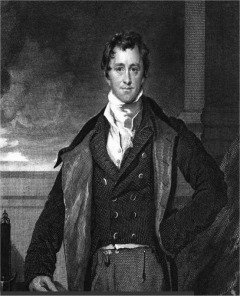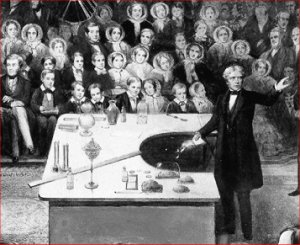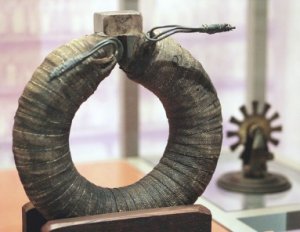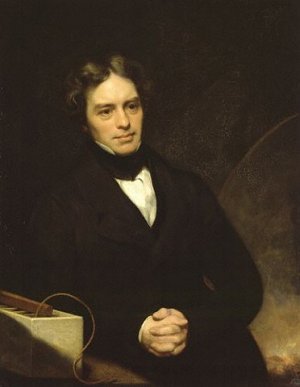When Michael was young he asked questions continually to the point that his teachers and his father wanted him to stop questioning, but his curiosity was endless.
When he was 15 years old he worked as an errand boy for a man who was a bookbinder and bookseller. Making books in those days was a tedious, time-consuming task as everything had to be done by hand. Mr. Riebau, the owner, took him on as an apprentice without charge because the boy showed such promise.
Michael learned how to bind books and he read every book he bound, as well as other books. He was especially interested in science books. His brother paid for him to attend lectures given by leading scientists. After seven years as an apprentice he had to decide whether he was going to be a bookbinder or a scientist and philosopher. Mr. Riebau told him he would have to make up his own mind.
Faraday had an opportunity to work with Sir Humphrey Davy, one of the greatest scientists of the day. He became a laboratory assistant at the Royal Institution where he was given a salary and also a place to live. The Royal Institution of Great Britain in London was started in 1799 to help poor people. Its original purpose was to help them improve themselves and advance in society. However, that idea was soon abandoned and the Royal Institution became a scientific society. The teachers were called "professors". One might call it a university.
Sir Davy was so impressed with Faraday's work he invited the young man to accompany him on an expedition to Europe. Michael mainly served as his valet and Mrs. Davy's demands and condescending* to him made the trip difficult. After enduring her treatment he vowed to never marry. (Later, however, he would change his mind about marriage.) He was glad when the threesome returned to London.

Sir Humphrey Davy, noted scientist
Upon their return to England Faraday was promoted to "Assistant and Superintendent of the Apparatus of the Laboratory and Mineralogical* Collection". It was quite a lengthy title and it was a step up for him. He received a raise in salary and better living quarters.
Faraday studied diligently and began to give lectures. People came to him for advice.

Michael Faraday giving a lecture
In 1821 he began to investigate electromagnetism.* That year he produced the very first electric motor with a wire turning around a magnet. In his eagerness he published a paper, not waiting to talk to William Hyde Wollaston who had also been working on the same idea, but had not published anything about it. This presumptuousness* on his part caused a rift between Faraday and the other scientists. He apologized and went back to the study of chemistry. He developed a new kind of strong steel which would not rust.
Through the church he met Sarah Barnard who would cause him to change his mind about not marrying. They were married in 1821 and she became a great help and encouragement to him. Though they never had children of their own, they delighted in their nieces and nephews.
In 1823 he was recommended as a fellow of the Royal Society, a high honor indeed. The only person opposing his election was his former teacher Sir Humphrey Davy, who seemed to be jealous of the fame his former student enjoyed, but he later had a change of heart and suggested that Faraday be appointed director of the laboratory at the Royal Institution.
Every Friday he gave lectures which even Prince Albert and the Prince of Wales attended. He gave more than 100 of these lectures instructing people of the usefulness of science. He gave lectures for children at Christmastime. These lectures continue even to the present time.
Faraday taught that all objects are matter and all objects are fields of force. From these thoughts he developed his ideas on fields of force, the Field Theory. Sir Isaac Newton had stated that forces can act only on objects. Faraday differed when he theorized* that forces act on forces and not objects.
Faraday was an admirer of Benjamin Franklin and the experiments he had done with electricity. He was also excited about Alessandro Volta's experiments. Volta had made the world's first battery. The unit of force called "volts" is named for him.
He was offered a professorship of chemistry at the University of London, but he turned it down. He wanted to continue his experiments.
In 1821 he began to investigate electromagnetism.* That year he produced the very first electric motor with a wire turning around a magnet. In his eagerness he published a paper, not waiting to talk to William Hyde Wollaston who had also been working on the same idea, but had not published anything about it. This presumptuousness* on his part caused a rift between Faraday and the other scientists. He apologized and went back to the study of chemistry. He developed a new kind of strong steel which would not rust.
Through the church he met Sarah Barnard who would cause him to change his mind about not marrying. They were married in 1821 and she became a great help and encouragement to him. Though they never had children of their own, they delighted in their nieces and nephews.
In 1823 he was recommended as a fellow of the Royal Society, a high honor indeed. The only person opposing his election was his former teacher Sir Humphrey Davy, who seemed to be jealous of the fame his former student enjoyed, but he later had a change of heart and suggested that Faraday be appointed director of the laboratory at the Royal Institution.
Every Friday he gave lectures which even Prince Albert and the Prince of Wales attended. He gave more than 100 of these lectures instructing people of the usefulness of science. He gave lectures for children at Christmastime. These lectures continue even to the present time.
Faraday taught that all objects are matter and all objects are fields of force. From these thoughts he developed his ideas on fields of force, the Field Theory. Sir Isaac Newton had stated that forces can act only on objects. Faraday differed when he theorized* that forces act on forces and not objects.
Faraday was an admirer of Benjamin Franklin and the experiments he had done with electricity. He was also excited about Alessandro Volta's experiments. Volta had made the world's first battery. The unit of force called "volts" is named for him.
He was offered a professorship of chemistry at the University of London, but he turned it down. He wanted to continue his experiments.
He made an iron ring with copper wire coiled around it. After months of experimenting with it he developed the first dynamo. His discovery made it possible for the world to have electricity. It would be up to others to develop the practical side of the invention.

Michael Faradays 1845 Magneto-Optical Electro-Magnet
Enlarge
Enlarge
Actually Joseph Henry in America had reached the same conclusions before Faraday, but had not published them, so Faraday usually gets the credit for inventing the dynamo.* Henry however went further into developing the idea, making the first telegraph system using electromagnetism. The invention of the telephone by others followed this. Joseph Henry became secretary of the Smithsonian Institution.
Faraday's experiments paved the way for the modern use of electrolysis* which is used to extract aluminum and copper from ore. It is also used to get sodium, hydroxide, chlorine, and hydrogen from brine. Silver and gold plating is accomplished by electrolysis.
He is honored to have a scientific term, an electrical unit, named after him. A "faraday" is the amount of electricity measured during electrolysis. Faraday was also the first to isolate and identify benzene.
He served as a consultant about the lighthouses and worked for methods of improving the lighting of the harbors.
His experiments began to take so much of his time he didn't have time to earn a living by consulting. His friends urged the government to give him a pension.
His health began to fail and his memory was impaired. After a disagreement in the church he reached his lowest point. When he was 50 years old he suffered a nervous breakdown and for a while had to have complete bed rest. Then he and Sarah his wife were able to get out and go to the zoo and attend plays. His health rallied and he made a remarkable recovery and was able to work another 17 years, but not at the level he had previously achieved.
He declined an offer to be the president of the Royal Society, and also an offer of knighthood was refused because he felt such accolades* were contrary to his religious beliefs and his sense of humility. When he refused the knighthood he said, "I have lived my life as a plain person, and I shall die as a plain person."
In 1861 he retired because his memory was so poor, and he and Sarah moved to a house in Hampton Court which Queen Victoria provided for them. His health continued to decline until he died on August 25, 1867.
You have Faraday to thank when your doctor orders an MRI (magnetic resonance imaging) scan. With it doctors can see inside your body without operating on you. Wherever electricity is generated today we have Michael Faraday to thank for the invention of the first electrical motor and the dynamo which makes it possible.
" Nothing is too wonderful to be true, if it be consistent with the laws of nature"
The Life and Letters of Faraday page 253
This biography by Patsy Stevens, a retired teacher, was written April 28, 2011.
The facts in this story were found in the following books:
Michael Faraday: Physics and Faith by Colin A. Russell (selected pages)
Order here
Michael Faraday: From errand boy to master physicist by Harry Sootin 1954
Michael Faraday by Ann Fullick 2001
Michael Faraday: Creative Scientist by Martin J. Gutnik 1986


 A frequent question:
A frequent question: